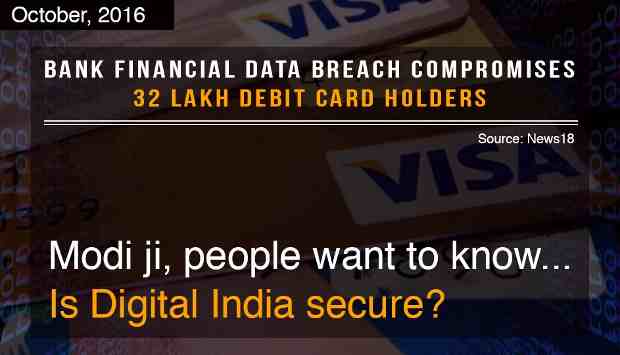Unsafe Digital India: Why You Must Not Use Digital Payment Modes

Unsafe Digital India
After demonetization, the government is adding fuel to the fire by promoting digital payments because tech infrastructure in India is not ready to handle digital transactions.
By Rakesh Raman
While the Government of India is promoting digital payment systems after the imposition of its demonetization scheme, most Indians do not know about the vulnerability of digital channels in the country.
The cyber infrastructure in India is so weak that it can be easily intruded by cyber thieves who can steal your money. This is evident from the fact that 3.2 million debit cards issued by Indian banks such as State Bank of India, HDFC Bank, ICICI Bank, YES Bank, and Axis Bank were compromised a couple of months ago.
As it was stated to be one of the biggest cyber thefts of financial data in India, reportedly many consumers lost their money from unauthorized usage of their cards from locations such as China.
Since India lacks technology expertise to check cyber thefts, the Indian government and financial institutions cannot protect the digital channels.
Earlier this month, for example, the Congress party had filed a complaint with the cyber cell of Delhi Police alleging that its website and Twitter account have been hacked. The party also stated in its complaint that the hackers have threatened to make all emails of the Congress party public by Christmas.
Poor Tech Infrastructure
While the government bosses (bureaucrats and politicians) are clueless about digital technology, they are working with a herd mentality to impose e-payment transactions in the form of debit / credit cards, digital wallets, etc. in a country where nearly 99% people are digitally challenged and digital infrastructure is unsafe.
You will be surprised to know that even the government websites are still not properly developed while the Internet came to India more than two decades ago in 1995. Then how can you expect the government to ensure cyber security which is a highly technical job?
India is an underdeveloped country in terms of tech usage. According to The Global Information Technology Report released by the World Economic Forum, India’s rank is a poor 83 in the world. That means India is still tottering in the Stone Age, while the world is galloping in the Information Age.
Although the Indian governments squander public money worth billions of dollars in the name of technology introduction, their tech interfaces to provide citizen services and financial services are extremely raw and crude.
Why Digital Payments
The steps to promote cashless transactions and digital payments are being taken because last month the Indian government had abruptly ordered to remove frequently used currency notes from the market.
The Prime Minister of India Narendra Modi had demonetized currency notes of Rs. 500 and Rs. 1000 on November 8, saying that the step has been taken to check corruption and stop the flow of black money.
[ Modi to Indians: Hey, Now Your Money Is My Money ]
Common people and opposition parties in India are up in arms against the government because the decision to stop the circulation of currency is causing severe hardships to commoners.
This war-like situation is causing deaths of innocent people who keep standing in queues even in harsh weather with the hope to get their old currency exchanged from banks.
Now, the government is adding fuel to the fire by promoting digital payments because tech infrastructure in India is not ready to handle digital transactions.
Global Trends
In today’s increasingly connected world, digital security has become one of the most critical issues for governments and businesses alike.
Even the cyber space of an advanced country like the U.S. is not safe. The U.S. intelligence agencies have reported about the Russian hacking of U.S. presidential election that Donald Trump won last month after defeating his rival Hillary Clinton.
Amid reports of hacking, President Barack Obama has ordered a full investigation into the election that Trump won. Even Republicans have supported the decision for an inquiry, which is expected to be completed before January 20, 2017 when Trump is supposed to begin his presidency.
[ Election Fraud: Trump May Not be the Next U.S. President ]
When hackers can invade highly protected government systems in a country like the U.S., it is easier for them to steal financial data and money from private banking systems in a country like India.
Although financial theft using digital tools is a worldwide phenomenon, it can cause severe damage to people’s money in an underdeveloped country like India.
A report sponsored by digital security company McAfee estimates that the annual damage from cyber attacks to the global economy is at $445 billion.
And approximately $1.5 billion was lost in 2012 to online credit and debit card fraud in the U.S. In 2016, a study by tech market research company Juniper Research estimated that the costs of cybercrime could be as high as $2.1 trillion by 2019.
These trends show that India is not yet ready to adopt digital methods of payment. The government should first create a reliable backend infrastructure before asking consumers to use frontend devices to buy products and services from the market. And that’s the whole point.
By Rakesh Raman, who is a government award-winning journalist and runs free school for deserving children under his NGO – RMN Foundation.
Photo courtesy: Congress














